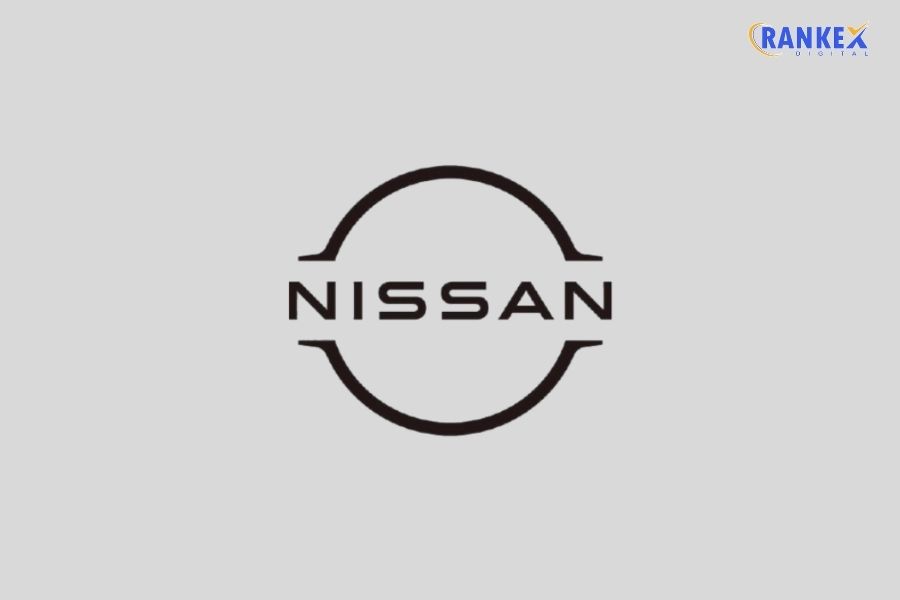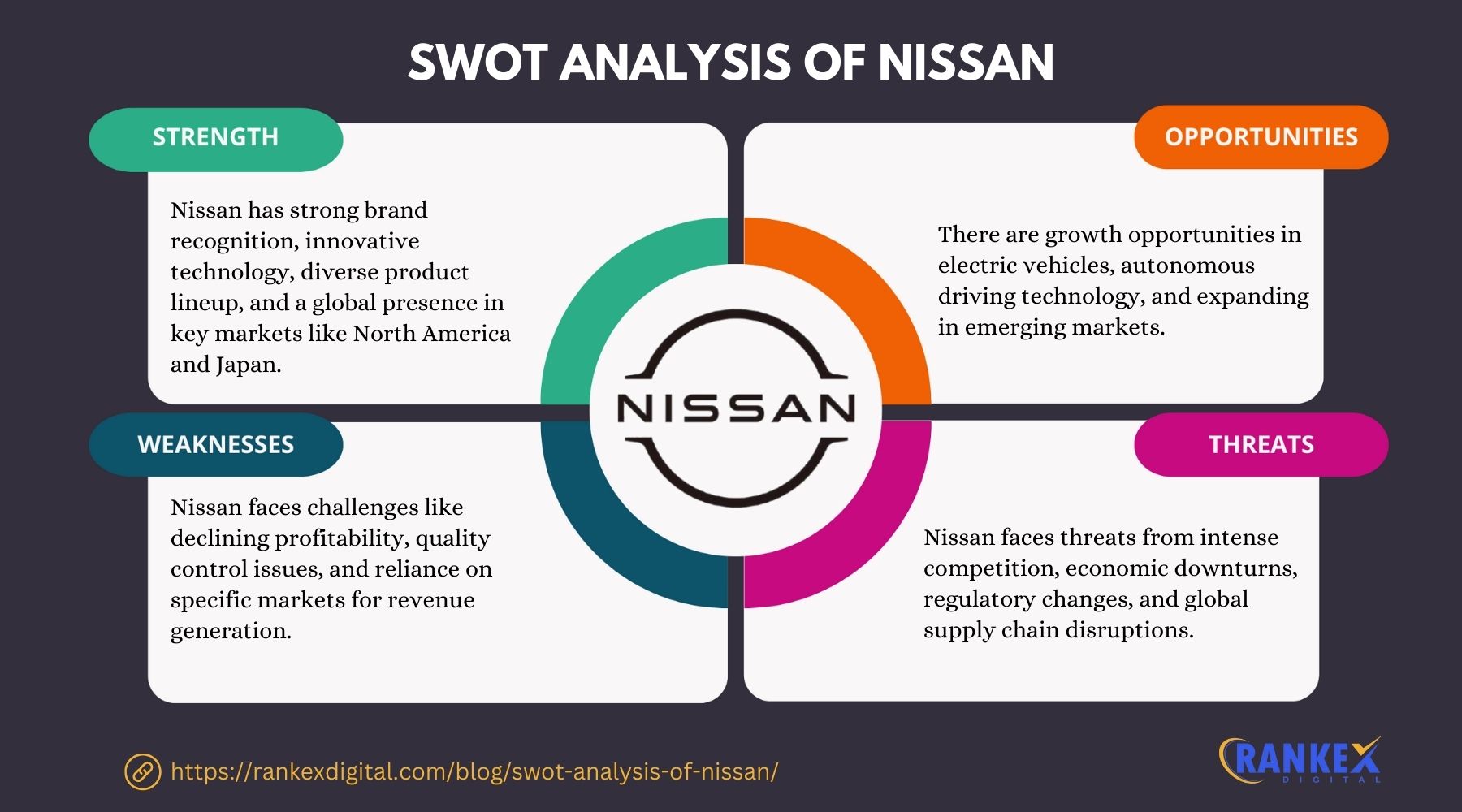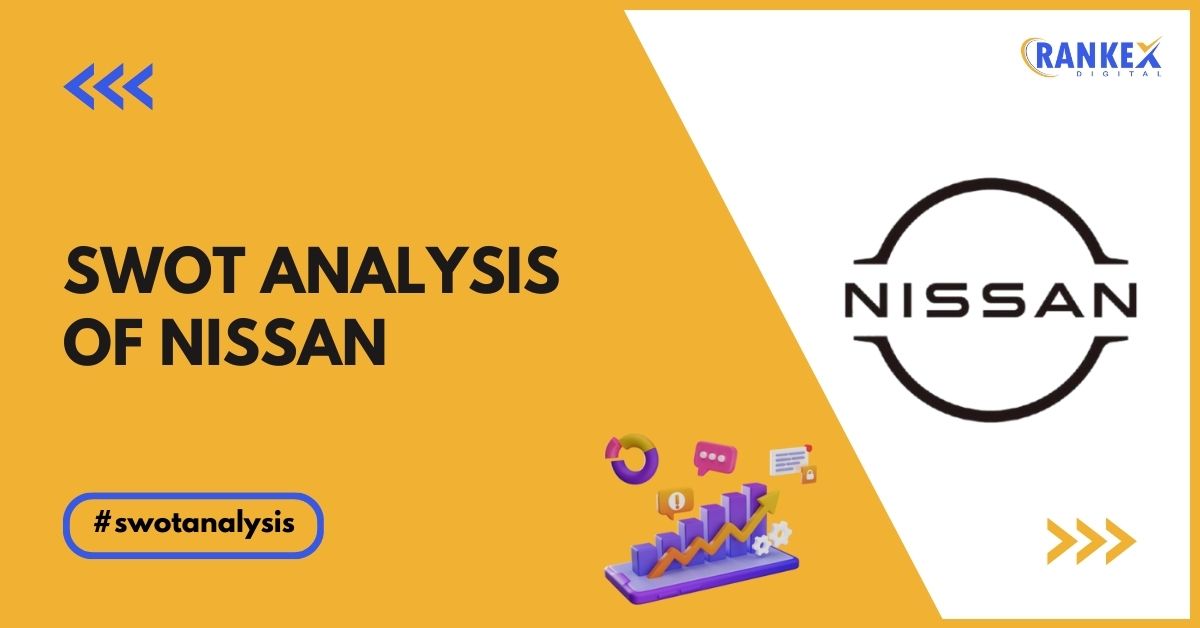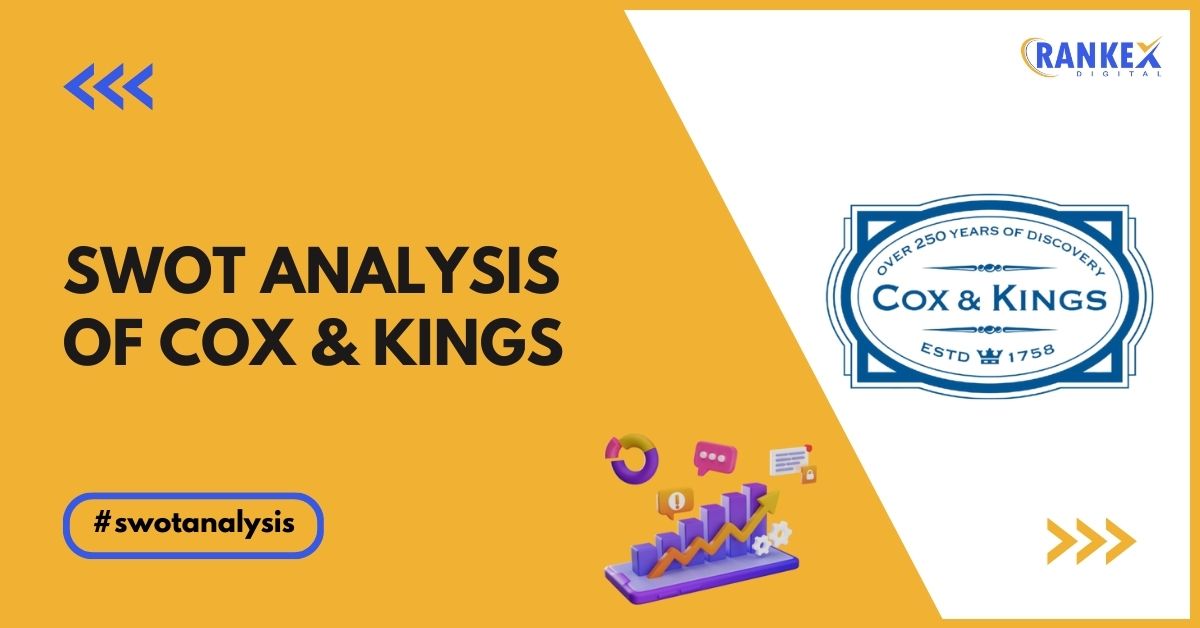Nissan, one of the leading players in the global automotive industry, has built a reputation for producing a wide range of vehicles, from compact cars to SUVs and electric vehicles. With a strong global presence and a history of innovation, Nissan’s journey has been shaped by both triumphs and challenges.
In this blog, we will conduct a SWOT analysis of Nissan to better understand its position in the highly competitive automotive market.
In this blog
Overview of Nissan

Nissan, founded in 1933, is a Japanese multinational automobile manufacturer headquartered in Yokohama, Japan. Known for its innovative technologies and extensive vehicle lineup, Nissan operates in more than 160 countries worldwide. The company is part of the Renault-Nissan-Mitsubishi Alliance, which provides significant synergies in terms of shared platforms, technology, and resources.
Quick Stats About Nissan
| Attribute | Details |
|---|---|
| Founder | Yoshisuke Aikawa |
| Year Founded | 1933 |
| Headquarters | Yokohama, Japan |
| Employees | 138,000+ |
| CEO | Makoto Uchida |
| Revenue (2023) | $86.2 Billion |
| Net Income (2023) | $3.5 Billion |
SWOT Analysis of Nissan

Strengths of Nissan
- Global Brand Recognition: Nissan has established itself as a globally recognized brand known for quality, durability, and innovation. It enjoys strong recognition, especially in markets like the US, Europe, and Asia, where its vehicles are trusted by a loyal customer base. This wide-reaching brand strength helps the company maintain a competitive edge in various regions.
- Strong Portfolio of Vehicles: Nissan offers a diverse and comprehensive range of vehicles, including compact cars, sedans, SUVs, trucks, and commercial vehicles. Their variety ensures that they can cater to various customer preferences, from economical and fuel-efficient models to high-end luxury vehicles. Additionally, Nissan’s focus on electric vehicles (EVs) broadens its appeal to environmentally conscious consumers.
- Commitment to Electric Vehicles: Nissan has been a pioneer in the EV market, with the Nissan Leaf being one of the world’s best-selling electric cars. This commitment to sustainability aligns with global trends toward greener technologies, allowing Nissan to position itself as a leader in electric mobility. The company’s forward-thinking approach toward sustainability helps it stay competitive in an industry increasingly focused on reducing emissions.
- Advanced Technology and Innovation: Nissan has made significant strides in automotive technology, particularly in areas like autonomous driving, electric mobility, and in-car tech. Features like ProPILOT Assist, a semi-autonomous driving system, and NissanConnect, which integrates advanced connectivity with driver convenience, exemplify its commitment to enhancing user experience through innovation.
- Efficient Manufacturing and Global Reach: Nissan’s efficient manufacturing processes and a global network that spans over 160 countries ensure it can meet the demands of various markets. Its widespread presence and strong distribution channels allow Nissan to tap into diverse markets while adapting its products to local needs and preferences.
Weaknesses of Nissan
- Overreliance on the US Market: While Nissan is a global brand, a significant portion of its revenue comes from the North American market, particularly the United States. This dependency makes Nissan vulnerable to shifts in the US economy, such as recessions or changes in consumer preferences. For example, any downturn in the US car market or changes in government policies can significantly impact Nissan’s financial performance.
- Declining Market Share in Key Regions: Despite a strong presence globally, Nissan has faced challenges in maintaining its market share in critical regions like Europe and Japan. Competition from both traditional automakers (like Toyota, Honda, and Ford) and newer EV-focused companies (like Tesla) has intensified, putting pressure on Nissan to adapt its strategies and offerings.
- Quality Control Issues: Nissan has faced several quality control issues, including product recalls that have damaged its reputation. These issues, particularly in markets where the brand has a high customer base, can hurt consumer trust. Ensuring consistent quality across its product lineup remains a challenge, and any lapses in quality could lead to customer dissatisfaction.
- Management Instability: Leadership instability has been a significant issue for Nissan, particularly after the 2018 arrest of its former CEO Carlos Ghosn. Ongoing management challenges, including leadership changes and internal conflicts, have affected the company’s strategic direction and its ability to respond to market demands effectively. This has led to a lack of clear long-term vision in some areas of the business.
- Limited Innovation in Non-EV Segments: While Nissan is a leader in the EV segment, it has lagged behind in the innovation of traditional internal combustion engine (ICE) vehicles. In comparison, brands like BMW and Mercedes-Benz continue to push boundaries in the luxury car market, leaving Nissan with fewer competitive advantages in these segments.
Opportunities for Nissan
- Expansion of Electric Vehicle Offerings: The global push towards sustainability and stricter environmental regulations presents a major opportunity for Nissan to expand its electric vehicle lineup. The increasing demand for eco-friendly vehicles gives Nissan a chance to enhance its presence in the EV market, especially as more consumers seek alternatives to traditional gasoline-powered cars.
- Strategic Alliances and Partnerships: The Renault-Nissan-Mitsubishi Alliance allows Nissan to leverage resources, share costs, and co-develop technologies. Collaborations with tech companies in areas like autonomous driving and AI can also help accelerate innovation and enable Nissan to stay competitive in a rapidly evolving market.
- Growth in Emerging Markets: Emerging markets like India, Southeast Asia, and Latin America present significant growth opportunities for Nissan. As these markets continue to urbanize and their middle classes expand, the demand for affordable, reliable vehicles is increasing. By offering vehicles tailored to local needs, Nissan can tap into this growing customer base.
- Advances in Autonomous Driving: With investments in autonomous driving technology, Nissan is well-positioned to capitalize on the future of self-driving cars. As consumer acceptance of autonomous vehicles increases and regulations evolve, Nissan can leverage its early investments to establish itself as a leader in the autonomous driving space.
- Focus on Sustainable Manufacturing: Nissan has the opportunity to further strengthen its brand image by focusing on sustainable manufacturing practices. Incorporating more recycled materials into its vehicles and reducing its carbon footprint can appeal to environmentally conscious consumers, especially as global awareness of sustainability issues continues to rise.
Threats to Nissan
- Intense Competition: The automotive market is highly competitive, with major players like Toyota, Honda, and Ford, alongside emerging electric vehicle brands like Tesla. Nissan faces the constant challenge of staying innovative and competitive in both the traditional automotive space and the rapidly growing electric vehicle market.
- Economic Uncertainty: Economic downturns, trade wars, and geopolitical tensions can disrupt consumer purchasing behavior. During periods of economic uncertainty, demand for vehicles—particularly premium models—tends to decrease. Nissan’s profitability may suffer in such conditions, especially if consumers delay purchasing vehicles due to financial concerns.
- Changing Consumer Preferences: With increasing interest in electric and hybrid vehicles, Nissan must continually adapt to these evolving consumer preferences. Failing to meet the demand for greener, more efficient cars could result in the company losing relevance in critical markets, particularly as competition intensifies in the EV segment.
- Regulatory Pressure: The automotive industry is facing increasingly stringent regulations regarding emissions, safety standards, and fuel efficiency. These regulatory pressures could force Nissan to invest heavily in research and development to ensure compliance with new laws, leading to higher costs and potentially impacting profitability.
- Supply Chain Disruptions: The global automotive supply chain has faced significant disruptions in recent years, including shortages in semiconductor chips and raw materials. Nissan, like other automakers, is vulnerable to these disruptions, which can lead to delays in production, inventory shortages, and delayed deliveries, impacting its ability to meet customer demand.
Frequently Asked Questions
What is Nissan’s biggest strength?
Nissan’s biggest strength is its global brand recognition, backed by a strong portfolio of vehicles and a commitment to electric mobility, with the Nissan Leaf being one of the most successful electric cars globally.
What are Nissan’s key weaknesses?
Nissan’s key weaknesses include overreliance on the US market, declining market share in regions like Europe and Japan, and management instability, which has affected the company’s strategic focus.
How is Nissan addressing the shift to electric vehicles?
Nissan is expanding its electric vehicle lineup and investing in new technologies to maintain its leadership in the EV market. The company is also focusing on sustainable manufacturing processes to attract environmentally-conscious consumers.
What opportunities does Nissan have in emerging markets?
Nissan has significant opportunities to grow in emerging markets such as India and Southeast Asia by offering affordable and reliable vehicles tailored to the specific needs of these regions.
What threats does Nissan face in the global automotive market?
Nissan faces threats from intense competition, changing consumer preferences towards electric and hybrid vehicles, and global supply chain disruptions that affect production and delivery.
Conclusion
Nissan’s SWOT analysis reveals a company with a strong foundation in global recognition, innovation, and sustainability efforts, particularly in electric vehicles.
However, it faces challenges such as management instability and intense competition from both traditional and new players in the automotive industry.
By focusing on expanding its electric vehicle offerings and leveraging its strategic alliances, Nissan can capitalize on new growth opportunities while addressing its weaknesses and external threats.











